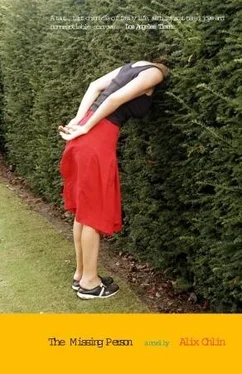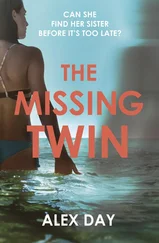In The Ball and Chain there were slashes of paint on the woman’s body, all shades of red, thick as mayonnaise, raised and bumpy. Some reds had blue undertones, others yellow, some as dark as Daphne Michaelson’s red lipstick. I thought of the way she’d named colors, as if reciting a code. Light is what makes every color, she’d said, and can be both particle and wave — these were such weird statements coming out of her mouth, and not likely something she’d read about in the pages of Vogue.
It made me wish I’d deciphered my father’s book on the temporal dimension in physics, and I thought, then, of Daphne standing alone at the backyard party, watching my father at the grill, watching the other women from inside the house. It occurred to me that she was trying to tell me something about my parents. She was there, after all, and could’ve seen everything that went on between my father and Eva Kent, between my mother and her husband. She’d identified the slash of red across her own face with a purposeful tone that was difficult to ignore; it was as if she were invoking the slash of red on the face of the woman in The Wilderness Kiss. And that light can be both wave and particle — what did that have to do with lipstick? Maybe nothing. Or maybe she meant that a single person can have two natures — that the father I knew was also painted by Eva Kent.
“What institution is she in now?” I asked Harold.
“It’s right by the yoga studio,” he said. “Linc rented that studio so they’d be close. He’s a good kid, visits her all the time. Enchanted Mesa, I think they call it. Don’t know where they come up with these names. There’s nothing enchanted about the place, I’ll tell you.”
“Probably not.”
“I guess you’ll be going,” he said, “now that you know the story.”
He walked me to the door, looking defeated and sad. Before I could think too much about it, I leaned over and kissed his wine-sweetened lips. He accepted the kiss with a kind of stunned grace. “Thanks for your help, Harold,” I said. “I mean it.”
“You’re welcome,” he said calmly. As I drove away I could see him watching me and leaning, as if swooning, against his front door.
It was late afternoon when I got back to Albuquerque, the day windless and harsh. Children and dogs were splashing in pools, shirtless men bent over the hoods of their cars, joggers with skin tanned the color of chocolate milk. In a city park, under elm trees, an extended family was having a barbecue, heat from its coals funneling up through the air, and the bright trash of chip bags and soda bottles scattered around them. There was only one person I urgently needed to see.
At our old house the butterflies still climbed across the walls, short of their destination. I rang the doorbell at the Michaelsons’ and waited for a full minute before Donny came to the door, looking as if he’d just woken up, the thick creases in his meaty cheeks reminding me, eerily, of scars.
“You again,” he said. “Can’t get enough of me, huh?”
“Right,” I said. “Can I see your mom?”
“My mom? Why?”
It was a perfectly reasonable question, and I wasn’t sure how to answer. Because I wanted to know exactly what she meant by “It’s a permanent wave”? This didn’t seem like the right thing to say. I smiled at him.
“She must get lonely, sitting in that room all the time,” I said. “I thought she might like having visitors.”
Donny frowned. “I don’t think she really gets lonely.”
“How do you know?” I said. “Have you ever asked her?”
“Uh, no.”
“So you don’t actually know.”
“I guess not.” He nodded slowly, then stepped back from the door and started down the hallway. Passing the kitchen, I saw Darren standing there; when he saw me, he waved, seemingly without surprise, and asked if I wanted a Popsicle. I shook my head no, and he shrugged good-naturedly. Donny knocked on the door of his mother’s room and let me in.
“You don’t have to stay,” I said. “I’ll just visit with her for a few minutes.”
He nodded again, slowly and a bit sleepily, and left.
Daphne Michaelson was as beautiful and well-maintained as the last time I’d seen her. Her red nail polish looked professionally applied, and her hair shone. She didn’t look at me. She was reading Vogue and nodding sagely at the pictures, as if they were revealing truths she’d long suspected about the world.
“Mrs. Michaelson,” I said, “What’s the permanent wave?”
She lifted her head and stared at me, a band of irritation rippling across her face at the interruption.
“Do you know who I am?” I said. She didn’t acknowledge the question, so I tried a different tack. I looked down at the glossy photos in her lap, where thin and gorgeous women were cavorting in an African savanna, wearing clothes of primitive and dangerous glamour; their lips were black and their teeth pointed and white. “I think those, um, fur-trimmed toga things are pretty,” I said. “Although I think it would be hard to walk around with all those claws and teeth, don’t you?”
Daphne straightened her posture and smiled at me. “It’s only fashion,” she said in a confiding tone. “It isn’t about the everyday world.”
“I guess you’re right,” I said.
“I know I am.”
“What did you mean about the permanent wave?”
She smiled at me gently, as if she felt sorry about how dense I was, and I sensed she was going to tell me something important, an answer she’d been waiting to deliver for years. What she said was, “It’s a chemical process for altering the texture of hair.”
Just then the door opened and David Michaelson came into the cool, dark room. Daphne went back to looking at her pictures, without acknowledging him in the least. I spent a second wishing hard that I was not here, or that he wasn’t. He was wearing one of his cowboy shirts with black jeans and a brass belt buckle. He was not smiling.
“Excuse me, Lynn,” he said. “May I see you outside for a moment?”
I walked out on insubstantial legs. He held the door for me, closed it behind us, and then gripped me by the upper arm, hard, and marched me out of the house and to my car. I felt like a juvenile delinquent with an angry high-school principal. The sun outside was so bright it made my eyes water, and I must have looked for all the world as if I were crying. David stood with his hands on his belted hips, examining my face in a measured, leisurely fashion, like the lawyer he was. He smelled like sweat and men’s deodorant, that fake, pungent musk.
“Why are you always here?” he finally said.
“I think ‘always here’ is overstating the case a little.”
“You’ve been here several times.”
“I’ve dropped by once or twice to say hello,” I said.
David snorted at this response, and I couldn’t blame him for it, really. He shook his head and tried again. “Why do you keep coming over to my house?”
“I didn’t think you’d mind,” I said slowly, “since you’re always coming over to mine.”
He breathed in sharply, his mouth open, and I could see his small, even teeth. Glancing away, I saw Donny and Darren watching us through the living-room window. Darren had an orange Popsicle in his hand; Donny grinned at me and waved. I waved back.
“Is that what this is about?” David said. “You don’t like my relationship with your mother, so you’re coming over here as some sort of revenge?” The words “my relationship” sounded very strange coming from him. “Again, possibly you’re overstating the case a little,” I said.
He sighed and looked off into the distance for a moment. I thought I saw a glimmer of wetness in his eyes, but it could have just been the glare. “My wife is a very sick woman,” he said. “She doesn’t live in the same world you and I do. But that doesn’t mean she can’t be upset by things. I don’t like for her to be upset.”
Читать дальше












